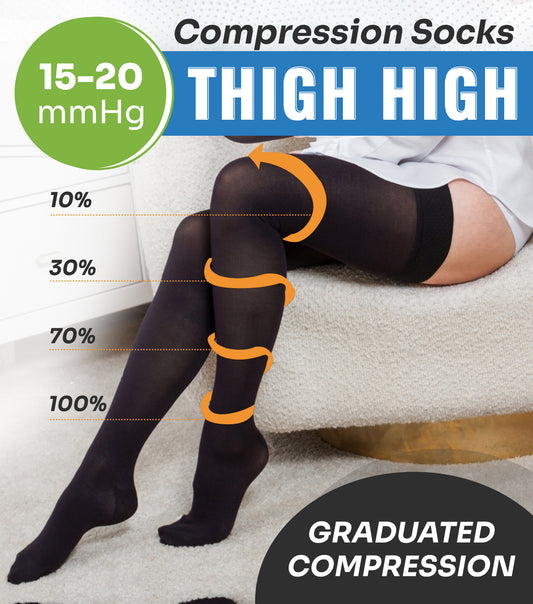

Featured Products
-
20-30 mmHg Compression Stockings Thigh-High, Closed Toe
Regular price $24.99Regular price Sale price $24.99Unit price -
15-20 mmHg Compression Stockings Thigh-high, Closed Toe
Regular price $24.99Regular price Sale price $24.99Unit price -
Anti-Embolism Stockings Thigh High, 15-20 mmHg, White
Regular price $14.99Regular priceUnit price$16.99Sale price $14.99Sale
Pregnancy is a crucial and critical phase of a women’s life. Along-with other issues Constipation is a very common problem during pregnancy. A study published in Acta Obstetricia et Gynecologica Scandinavica Reliable Source reveals that three out of four pregnant women do experience constipation and bowel disorder at some point in trimesters.
Symptoms

The common symptoms of constipation are:
- Infrequent and difficult bowel movements,
- Increased bowel transit duration
- Passing hard stool and
- Pain in the abdomen.
Causes
- Hormonal changes (increased progesterone and decreased motilin level) during pregnancy relax muscles including intestinal muscles. Relaxed or sluggish functioning of intestines slows digestion and bowel evacuation resulting into constipation.
- The pressure imposed on bowel due to evolving uterus makes intestines contracted making bowel movement difficult.
- High intake of dietary supplements such as iron (iron may give black colored calcium and prenatal vitamins may also contribute to constipation.
- Sundry life style and lack of body activities.
- Worrying and anxiety.
- Lower intake of fluids and dietary fibers.
- Excessive consumption of refined junk food, beverages, and alcohol.
- Constipation in pregnant women could develop due to medical complications also.
Preventive Home Remedies
The pregnant women can relieve constipation discomfort by following below given safe preventive measures and general treatments available at home.
- Sufficient Fluid Consumption in the form of water, fresh naturally sweetened vegetables and fruit juices, black and green tea, whole buttermilk, clear soups not only hydrate the body but also facilitate easy bowel movement. Avoid carbonated beverages, alcohol and excess caffeine during pregnancy.
- Dietary Fiber Intake increases bulk and stimulates comfortable passage of excreta through intestine. Normally, 28-38 gram fiber is recommended daily.
Fruits such as kiwis, dried plums, apples, raspberries, bananas artichokes, oranges, pears, mandarins, grapefruits, figs, dry fruits- almonds, cashews, dried grapes are rich source of nutrition, and fiber for pregnant women.
In vegetables–green leafy vegetables (spinach, broccoli, Brussels sprouts, Rhubarb, sweet potatoes, beans , peas , lentils, oat brans , whole grain breads, Psyllium can be added to the daily diet in moderation .
Shun eating spicy, oil rich, unhealthy snacks, refined flour (pasta, noodles, white rice etc.) and non-vegetarian food as these are hard to digest and induce constipation.
Eating meals in small proportions at regular interval of time (5-6 times a day), rather than overloading stomach by engulfing large quantities at one go, proves more comfortable and easy on intestines and colons preventing constipation.
- Include Probiotics in Diet: Probiotics are beneficial bacteria helping gut bacteria to digest food and boost natural bowel movements. Adding foods rich in probiotics in the diet of pregnant mothers helps relieve them discomfort of constipation. The food items that can be included in daily meals for extra intake of probiotics are yogurt, pickles, Kombucha (fermented tea), Kefir (butter milk), cottage cheese, sour dough bread, miso soup, sauerkraut and some supplements.
It is always wise to consult your doctor before implementing any diet charts and using nutritional supplements for pregnant women.

Moderate Exercising
A regular exercise during pregnancy and physical activity among pregnant women is found quiet helpful in reducing many pregnancy related discomforts including constipation. Continually sitting or lying at one place makes intestines contract developing difficult in smooth bowel movement.
Normal physical activities like walking, mild aerobics and practicing prenatal yoga helps relaxation of body and mind which in turn provides comfort from constipation as well.
Ensure guidance from your expert health advisor before taking to exercise during pregnancy for safety reasons.
Medical Treatment over-the-counter
Normally, constipation in pregnant women gets cured with natural home remedies. But, in case these methods do not work, medical prescription by doctors may be required.
The general medications available over the counter for curing constipation among pregnant women are:
- Bulk-forming agents (including psyllium, methylcellulose, and polycarbophil)
- Soft laxatives(include polyethylene glycol and magnesium hydroxide)
- Stool softeners such as docusate (Colace).
Stimulant laxatives should not be used as they induce uterine contractions. Prolonged constipation, rarely, can cause fecal impaction which need to be removed by doctor.
A word of caution is to always see your doctor before taking any laxative medicines or other constipation removing remedies during pregnancy for you and your baby’s’ safety.






